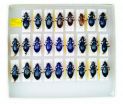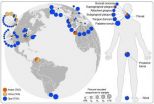(Press-News.org) New Haven, CT – A pair of Yale Cancer Center interventional studies involving breast cancer survivors found that lifestyle changes in the form of healthy eating and regular exercise can decrease biomarkers related to breast cancer recurrence and mortality. The abstracts are scheduled to be presented at the 2014 annual meeting of the American Society of Clinical Oncology in Chicago May 30-June 3rd.
"The findings of both studies support a growing body of research that suggests lifestyle interventions lower biomarkers associated with breast cancer recurrence and mortality, and improve quality of life," said Melinda Irwin, PhD, co-program leader of the Cancer Prevention and Control Research Program at Yale Cancer Center, associate professor of Epidemiology at Yale School of Public Health, and principal investigator on both studies.
The abstracts are below.
Effect of weight loss intervention on inflammatory and metabolic markers in breast cancer survivors. The lifestyle, exercise, and nutrition (LEAN) study. (#1505)
In this study, obese or overweight women were randomized into two groups — those who received weight loss and exercise counseling — and a usual care group that received a brochure about lifestyle changes. After six months, women in the weight loss counseling group experienced an approximate 30% decrease in C-reactive protein (CRP) levels compared with a minimal decrease in women randomized to the usual care group. CRP is a marker of chronic inflammation and higher CRP levels have been associated with a higher risk of breast cancer mortality. A dose-response effect was found in women randomized to weight loss counseling in that women who lost at least 5% body weight experienced an approximate 22% decrease in insulin, 38% decrease in leptin, and 55% decrease in CRP, compared to significantly less biomarker improvement in women randomized to weight loss who lost less than 5% body weight.
Effect of exercise on weight, body fat, and serum inflammatory biomarkers in breast cancer survivors with aromatase inhibitor arthralgias (joint pain): The hormones and physical exercise (HOPE) study. (#9356)
The HOPE study looked at the effect of exercise on body weight, body fat, and inflammatory biomarkers in 121 women with joint pain from taking aromatase inhibitors (AI) as adjuvant therapy. Participants were randomized into two groups — those who participated in twice-weekly strength training and 2.5 hr/wk of moderate-intensive aerobic exercise — and those who did no exercise (control group). After 12 months, the study found that the exercise group experienced an approximate 3% weight and body fat loss, and 6% decrease in CRP levels compared to increases in the control group.
Previous findings from the HOPE study showed exercise improved AI-associated joint pain, but results from this analysis of favorable decreases in body weight, fat and CRP found these markers did not mediate the beneficial effect of exercise on AI joint pain. Further HOPE analyses will be conducted to determine the mechanism(s) of how exercise improves AI joint pain.
Other authors on the LEAN study, all from Yale, were Erikka Loftfield, MPH; Maura Harrigan, MS, RD, CSO; Fangyong Li, MPH, MS; Xiaopan Yao; Brenda Cartmel, PhD; Yang Zhou, MPH; Mary Playdon, MPH;
Lingeng Lu, MD, PhD ; Tara Sanft, MD
Other authors on the HOPE study were Brenda Cartmel, PhD; Cary Gross, MD; Fangyong Li, MPH, MS; Xiaopan Yao; Martha Fiellin, MPH; Elizabeth Ercolano, PhD; Maura Harrigan, MS, RD, CSO; Yang Zhou, MPH; Tara Sanft, MD; Kathryn Schmitz, PhD; Dawn Hershman, MD; Jennifer Ligibel, MD
Yale University, New Haven, CT; University of Pennsylvania, Philadelphia, PA; Columbia University, New York, New York; Dana Farber Cancer Institute, Boston, MA.
INFORMATION:
About Yale Cancer Center
Yale Cancer Center (YCC) is one of only 41 National Cancer Institute (NCI)-designated comprehensive cancer centers in the nation and the only such center in Connecticut. Comprehensive cancer centers play a vital role in the advancement of the NCI's goal of reducing morbidity and mortality from cancer through scientific research, cancer prevention, and innovative cancer treatment. http://www.yalecancercenter.org
Yale Cancer Center studies find lifestyle changes improve biomarkers for breast cancer recurrence and mortality
2014-05-22
ELSE PRESS RELEASES FROM THIS DATE:
Repeated sexual assault victims report more psychological problems than previously thought
2014-05-22
COLUMBIA, Mo. – According to recent studies, one in five adult women and one in 100 adult men have reported being raped. The prevalence increases to two in five among women and one in five among men who report experiencing other forms of sexual violence, such as repeated unwanted sexual contact and sexual coercion. Now, researchers at the University of Missouri have determined that those victims who are repeatedly assaulted, but not necessarily violently raped, show greater levels of psycho-behavioral consequences than earlier thought. The researchers suggest that understanding ...
Male and female sex cell determination requires lifelong maintenance and protection
2014-05-22
MINNEAPOLIS/ST. PAUL (May 22, 2014) – The way in which the sex of an organism is determined may require lifelong maintenance, finds new research from the University of Minnesota. According to the study published today in the journal Developmental Cell, sex-specific transcription factors perform lifelong work to maintain sexual determination and protect against reprogramming of cells from one sex to the other.
Previous research at the University of Minnesota's Department of Genetics, Cell Biology, and Development showed sex determination is not permanent. Using a mouse ...
Study shows how common obesity gene contributes to weight gain
2014-05-22
NEW YORK, NY (May 22, 2014) — Researchers have discovered how a gene commonly linked to obesity—FTO—contributes to weight gain. The study shows that variations in FTO indirectly affect the function of the primary cilium, a little-understood hair-like appendage on brain and other cells. Specific abnormalities of cilium molecules, in turn, increase body weight, in some instances, by affecting the function of receptors for leptin, a hormone that suppresses appetite. The findings, made in mice, suggest that it might be possible to modify obesity through interventions that alter ...
Scientific collections play vital role in conservation biology
2014-05-22
Scientists from the California Academy of Sciences and more than 60 other international research institutions spanning six continents have responded to a recent paper in Science, which questioned current methods of scientific collecting and advocated the use of non-lethal alternatives. The response, led by Luiz Rocha, Ph.D., the Academy's Assistant Curator and Follett Chair of Ichthyology, and co-authored by such science luminaries as Harvard's E. O. Wilson and the Academy's Chief of Science and Sustainability, Margaret (Meg) Lowman, describes in detail the value that scientific ...
A glimpse into nature's looking glass -- to find the genetic code is reassigned
2014-05-22
In the Lewis Carroll classic, Through the Looking Glass, Humpty Dumpty states, "When I use a word, it means just what I choose it to mean—neither more nor less." In turn, Alice (of Wonderland fame) says, "The question is, whether you can make words mean so many different things." All organisms on Earth use a genetic code, which is the language in which the building plans for proteins are specified in their DNA. It has long been assumed that there is only one such "canonical" code, so each word means the same thing to every organism. While a few examples of organisms ...
RI Hospital researcher and colleagues discover protein that may lead to malaria vaccine
2014-05-22
VIDEO:
Jonathan Kurtis, M.D., Ph.D., director of the Center for International Health Research at Rhode Island Hospital, talks about the latest findings in their research to find a vaccine for malaria,...
Click here for more information.
PROVIDENCE, R.I. – Rhode Island Hospital researchers have discovered a protein that is essential for malaria-causing parasites to escape from inside red blood cells. Antibodies to this protein trap the parasite inside these red blood cells. This ...
Growing inequalities make science more of a 'winner takes all' field
2014-05-22
ANN ARBOR—As new research documents growing inequalities in health and wealth, the gap between "haves" and "have-nots" is growing in the field of scientific research itself, says University of Michigan sociologist Yu Xie.
"It's surprising that more attention has not been paid to the large, changing inequalities in the world of scientific research, given the preoccupation with rising social and economic inequality in many countries," said Xie, research professor at the U-M Institute for Social Research and professor of sociology, statistics and public policy.
The forces ...
Fruit flies show mark of intelligence in thinking before they act
2014-05-22
Fruit flies 'think' before they act, a study by researchers from the University of Oxford's Centre for Neural Circuits and Behaviour suggests. The neuroscientists showed that fruit flies take longer to make more difficult decisions.
In experiments asking fruit flies to distinguish between ever closer concentrations of an odour, the researchers found that the flies don't act instinctively or impulsively. Instead they appear to accumulate information before committing to a choice.
Gathering information before making a decision has been considered a sign of higher intelligence, ...
Collecting biological specimens essential to science and conservation
2014-05-22
ANN ARBOR—Collecting plant and animal specimens is essential for scientific studies and conservation and does not, as some critics of the practice have suggested, play a significant role in species extinctions.
Those are the conclusions of more than 100 biologists and biodiversity researchers who signed a letter to the journal Science scheduled for online publication May 22.
The letter is a response to an April 18 Perspectives article in Science arguing that alternative methods of documentation—such as high-resolution photography, audio recordings and nonlethal tissue ...
Newborn health improves despite income gap
2014-05-22
The U.S. economic inequality gap has been widening for decades, and research shows that maternal disadvantage may have health consequences for newborns. A review of recent economic research, however, finds that the health of newborns has actually improved nationally in recent years, despite data that would suggest otherwise.
"That was really surprising to us," said Anna Aizer, associate professor of economics at Brown University. Aizer and Janet Currie of the National Bureau of Economic Research and Princeton University published the review in a special issue of Science ...



